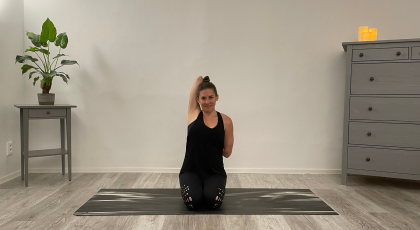View basket (0 items $0.00)

Research Suggests Yoga May Ease Symptoms of Prenatal Depression
Prenatal depression can lead to numerous immediate and long-term negative consequences for mothers and their children. Recent research suggests that prenatal depression is a strong predictor of postpartum depression, and is also associated with fetal growth delays, premature birth, low birth weight, disorganized sleep and less responsiveness to stimulation in newborns.
What’s more, infants of depressed mothers may have a greater likelihood of developing attention, emotional and behavioral problems during childhood and adolescence.
Yoga Research Review
A recent review of the yoga literature for expectant mothers published in BMC Psychiatry suggests that yoga that incorporates a combination of movement, breath, relaxation and meditation may help to alleviate depressive symptoms.
A group of researchers at the University of Shanghai conducted a systematic review of all of the published yoga research in which yoga was used as an intervention for pregnant women. They identified six articles that met their selection criteria.
Studies needed to be randomized controlled trials in which pregnant women were assigned to either a yoga group or a control group in order to be considered. Even though their analysis focused on depressive symptoms, samples of both depressed and non-depressed women were included. Yoga interventions could involve either “physical-exercise-based” yoga or “integrated yoga” in which breathing exercises (pranayama), meditation, relaxation, tai chi or other yogic techniques were used.
Only six studies including a total sample of 375 women met selection criteria. Of these, most collected only pre-and-post yoga class data. Studies were conducted in the United States (4), India (1) and the United Kingdom (1). Four included patients who were diagnosed with clinical depression using standardized diagnostic questionnaires.
 The researchers found the studies to be fairly low in quality in general. Articles often omitted important information including the randomization method, or rates of participant attrition. Other issues such as assessor’s knowledge of who attended the yoga intervention, baseline differences in depression scores between yoga and control groups, and other methodological problems were detected.
The researchers found the studies to be fairly low in quality in general. Articles often omitted important information including the randomization method, or rates of participant attrition. Other issues such as assessor’s knowledge of who attended the yoga intervention, baseline differences in depression scores between yoga and control groups, and other methodological problems were detected.
The results of this review suggest that, in general, both depressed and non-depressed women reported significantly lower levels of depressive symptoms compared to controls after completing a yoga intervention. What’s more, analyses showed that only women who attended “integrated” yoga classes reported significantly fewer symptoms of depression whereas those who engaged in “exercise-based” yoga did not.
Limbs of Yoga Helps Women with Prenatal Depression
This review suggests that yoga programs that combine movement (asana), breathing exercises (pranayama), relaxation and meditation techniques as opposed to movement alone may be of greatest benefit to women suffering from depressive symptoms during pregnancy.
These findings are consistent with the research suggesting that high levels of prenatal stress predisposes expecting women to a higher risk for depression and anxiety during pregnancy, and provide support for the fact that multiple limbs of yoga can have an additive effect when dealing with complex emotional issues.
Read more from YogaUOnline on Yoga & Pregnancy: A Winning Combination for Mothers and Babies.
 B Grace Bullock, PhD, E-RYT 500 is a psychologist, research scientist, educator, author, yoga and mindfulness expert and creator of BREATHE: 7 Skills for Mindful Relationships. Her mission is to reduce stress, increase health and wellbeing and improve the quality of relationships. She offers classes, workshops, writing and research that combine the wisdom of applied neuroscience, psychophysiology, psychology and contemplative science and practice. Her goal is to empower individuals, groups, leaders and organizations to reduce chronic stress and increase awareness, attention, compassion, mindfulness and effective communication to strengthen relationships, release dysfunctional patterns and unlock new and healthy ways of being. Dr. Bullock is a Certified Viniyoga Therapist and Faculty at the Integrated Health Yoga Therapy (IHYT) Training program. She is the former Senior Research Scientist at the Mind & Life Institute and former Editor-in-Chief of the International Journal of Yoga Therapy. For more information see www.bgracebullock.com
B Grace Bullock, PhD, E-RYT 500 is a psychologist, research scientist, educator, author, yoga and mindfulness expert and creator of BREATHE: 7 Skills for Mindful Relationships. Her mission is to reduce stress, increase health and wellbeing and improve the quality of relationships. She offers classes, workshops, writing and research that combine the wisdom of applied neuroscience, psychophysiology, psychology and contemplative science and practice. Her goal is to empower individuals, groups, leaders and organizations to reduce chronic stress and increase awareness, attention, compassion, mindfulness and effective communication to strengthen relationships, release dysfunctional patterns and unlock new and healthy ways of being. Dr. Bullock is a Certified Viniyoga Therapist and Faculty at the Integrated Health Yoga Therapy (IHYT) Training program. She is the former Senior Research Scientist at the Mind & Life Institute and former Editor-in-Chief of the International Journal of Yoga Therapy. For more information see www.bgracebullock.com
Sources
Gong, H., Ni, C., Shen, X., Wu., T & Jiang, C. (2015). Yoga for prenatal depression: A systematic review and meta-analysis. BMC Psychiatry, 15(14). DOI 10.1186/s12888-015-0393-1
Featured Courses









